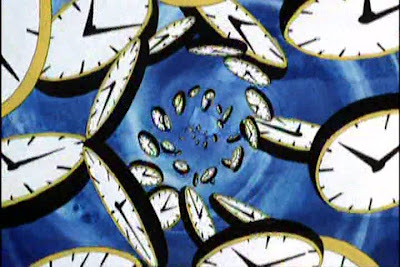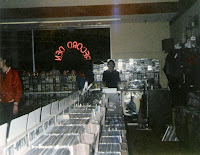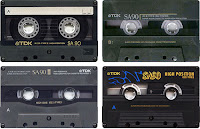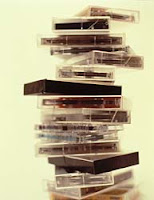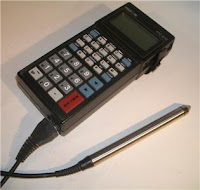At the time of its construction in 1961, Great Lakes Mall, incredibly, was the biggest enclosed shopping center in the country. Over the years, that title slipped away after newer and larger mega-malls opened across North America as an explosion in retail construction changed (or, some might say, defined) the face of suburbia over the two decades that followed.
 By the late 1980s, however, a more "open," brighter aesthetic to mall design had arrived in town that stressed atrium-like skylights and a less purely functional, more vaguely ancient Roman look to the support columns and tiled floors. Compared to these polished new locations, Great Lakes Mall began to less like a trendy shopping destination and more like a dim, drab cave. In order to keep their million-square foot property up to date (and their anchor tenants happy), the DeBartolo group set in motion a complete renovation of the common mall area that spanned most of 1989. Construction proceeded during open hours, of course, and for a few months during the summer, the constant muzak piping through the mall's PA system was completely drowned out by power tools wielded by workers up on scaffolds or hidden by giant drop cloths. When everything was finally finished before the start of the next Christmas rush, the mall certainly looked far more modern, well-lit, and "trendy" than it had before.
By the late 1980s, however, a more "open," brighter aesthetic to mall design had arrived in town that stressed atrium-like skylights and a less purely functional, more vaguely ancient Roman look to the support columns and tiled floors. Compared to these polished new locations, Great Lakes Mall began to less like a trendy shopping destination and more like a dim, drab cave. In order to keep their million-square foot property up to date (and their anchor tenants happy), the DeBartolo group set in motion a complete renovation of the common mall area that spanned most of 1989. Construction proceeded during open hours, of course, and for a few months during the summer, the constant muzak piping through the mall's PA system was completely drowned out by power tools wielded by workers up on scaffolds or hidden by giant drop cloths. When everything was finally finished before the start of the next Christmas rush, the mall certainly looked far more modern, well-lit, and "trendy" than it had before.Another new concept that most new malls had glommed onto (including Great Lakes) at the end of the 1980s was the "food court." Before the start of the renovation project, several restaurants and fast-food locations were scattered about the "main drag" of the complex, and nearly all of them wound up moving into the newly-created food court almost immediately after construction was completed (the one or two chains that did not opt to relocate quietly vanished when their leases came up for renewal). Happily for Great Lakes Mall, this reorganization of available space added some more greatly-needed slots for the one or two sellers of pointlessly expensive shoes and foofy women's accessories that were not already renting there. Huzzah.
Right smack in the midst of all of these newly refaced store fronts and brightly colored exteriors stood the J.J. Newberry's store, which had overnight turned into a once-quaint eyesore. If the rest of the mall represented a clean, immaculately maintained street in a quiet suburban subdivision, Newberry's was the dumpy house with the pink flamingos on the grass and the old Chevy truck up on bricks next to the cracked, oil-stained driveway. In their mad dash to keep up with the Joneses (better known as Beachwood Place and Great Northern Mall), Great Lakes Mall had no need for a five-and-dime straight out of Hooterville cluttering up the busiest part of the main strip. At the end of 1991, Newberry's had finally reached the end of their lease, and there would be no renewal.
For the Record Den and the two or three other tenants sub-leasing space around the department store, it was suddenly time to find new digs, and fast. Obviously, the big news was not being taken well by Newberry's employees (my girlfriend at the time numbered among them), who were understandably upset that their jobs were about to vanish into thin air. We at the Den were a tad apprehensive as well, especially when we discovered that we had nowhere to go: it appears that our home office had been caught off guard by the news as they would not have a new location ready for us to move into until late summer 1992. Ruh roh ...
As the 1991 Christmas season wound to a close and Newberry's began to noticeably empty of product, we found out that the Den would be allowed to remain in operation for the time being in our currently-leased space. Asking to stay where we were for the better part of a year would likely have been problematic, so a temporary location would be necessary to move into until our permanent digs were finished and ready. As it happened, the wait until we made our way to this temporary location was about 4-6 weeks, and during that time, our store space was gradually "walled off" from the rest of the disappearing Newberry's location by a series of 6 1/2' tall cassette racks, with the only possible entry to our store through the same massive sliding glass doors the department store had once used, now opened just wide enough for a couple of people to walk through at a time.
To follow the events of the next few months, I hereby supply you with a rough map of the Great Lakes Mall floor plan. Until January of 1992, the spot taken up by J.J. Newberry's was the letter "H" on the map above, with the exact location of the Record Den a tad to the right of that letter and directly on the "main drag" of the mall. OK, off we go ...
At the end of March, our first temporary location was ready: an old shoe store near the center of the mall (about parallel to the top of the letter "G" in the Dillards wing), sporting two large, bay-window type display cases and an actual back room for shipping, receiving and overstock. This news alone had us over the moon: in our ridiculously-cramped previous location, there was a space behind the miscellaneous product wall where coats, import posters and a vacuum cleaner were kept and that was it ... all other storage space was a few hundred feet away in the Newberry's shipping-and-receiving department. This temporary store was going to feel like a freaking warehouse in comparison.
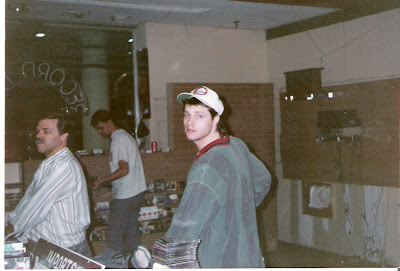 The move itself could have been a lot worse, but it certainly wasn't anyone's definition of "fun." I'm guessing I speak for everyone who showed up to lend a hand that, pleasant or not, none of us would have missed this night. We all felt a deep connection to the history of the Den (or at least a morbid curiosity to see it empty), especially Greg, who had been working there since the end of 1973. I don't remember there being any outright sadness expressed at the time, but more of a resigned feeling of letting go and moving on.
The move itself could have been a lot worse, but it certainly wasn't anyone's definition of "fun." I'm guessing I speak for everyone who showed up to lend a hand that, pleasant or not, none of us would have missed this night. We all felt a deep connection to the history of the Den (or at least a morbid curiosity to see it empty), especially Greg, who had been working there since the end of 1973. I don't remember there being any outright sadness expressed at the time, but more of a resigned feeling of letting go and moving on. Being that we were on the eve of one of the biggest release weeks of the year, closing our doors for a day or so in order to tidy ourselves up was not an option. There wasn't an awful lot of time to screw around, particularly since our company's owner had provided us with these horrible new "waterfall" display racks that, on one hand, "faced out" a lot more titles than was possible with our old converted vinyl bins, but also were a royal pain in the ass to work with and took a lot of extra time to set up.
Being that we were on the eve of one of the biggest release weeks of the year, closing our doors for a day or so in order to tidy ourselves up was not an option. There wasn't an awful lot of time to screw around, particularly since our company's owner had provided us with these horrible new "waterfall" display racks that, on one hand, "faced out" a lot more titles than was possible with our old converted vinyl bins, but also were a royal pain in the ass to work with and took a lot of extra time to set up.I am happy to report that we junked these ungainly bastards by the time we reached our permanent digs.
 The whole process from start to finish was a grueling all-nighter: we started breaking down the old store shortly after the mall closed at 6:00 on Sunday evening, boxing up thousands of CDs and tapes and then getting the fixtures themselves ready to move. It was nearly midnight by the time we were ready to start shuttling boxes and fixtures down the mall in two-man teams, after rigging up some clunky old four wheelers to support the damn things. From there, the rest of that night was spent transporting the guts of the old store down to the temporary location, punctuated by some horsing around with the mall's Easter display during our few moments of downtime. By the time we called it a night, the store wasn't exactly pretty, but it was ready to run and that was all it needed to be: we had weeks to do the rest of the fine tuning ... or so we thought.
The whole process from start to finish was a grueling all-nighter: we started breaking down the old store shortly after the mall closed at 6:00 on Sunday evening, boxing up thousands of CDs and tapes and then getting the fixtures themselves ready to move. It was nearly midnight by the time we were ready to start shuttling boxes and fixtures down the mall in two-man teams, after rigging up some clunky old four wheelers to support the damn things. From there, the rest of that night was spent transporting the guts of the old store down to the temporary location, punctuated by some horsing around with the mall's Easter display during our few moments of downtime. By the time we called it a night, the store wasn't exactly pretty, but it was ready to run and that was all it needed to be: we had weeks to do the rest of the fine tuning ... or so we thought. I think it was on the following Saturday that we were visited in our store by the mall manager, a grim, buzzard-like man who always dressed in a soulless, slate gray suit. As was his style, he came right to the point: the space we were inhabiting had actually been slated for someone else and we would have to vacate in seven days. To say we didn't take this very well might be a bit of an understatement ... I think "thunderstruck" better approximates the feeling of that moment.
I think it was on the following Saturday that we were visited in our store by the mall manager, a grim, buzzard-like man who always dressed in a soulless, slate gray suit. As was his style, he came right to the point: the space we were inhabiting had actually been slated for someone else and we would have to vacate in seven days. To say we didn't take this very well might be a bit of an understatement ... I think "thunderstruck" better approximates the feeling of that moment.The next move took us across the Dillard's wing to a point about parallel with the bottom of that letter "F" on the supplied mall map. Our second temporary location had previously been a jewelry store and, judging by the huge, cavern-like back room (a handy place for making out with your girlfriend during lunch breaks, it turns out) with rows of wooden shelves extending well over our heads, most likely a shoe store before that. Unfortunately, this new location was also as nearly invisible to mall traffic: the polar opposite of our previous location. Instead of two huge glass bay windows, we were now completely shut off from the mall, with an almost comically-small front doorway about as wide as two people standing side by side. In fact, the only space we had to offer any clue we were a record store (besides the garish-looking sign we had strung up directly over the name of the previous tenant) were two enclosed case-like window displays that were more suited to showing off engagment rings and necklaces than promotional displays for, say, the new Ride or Wire Train release (though I do recall Beth coming up with a pretty cool underwater-looking "Weird Al" Yankovic display that exploited these little spaces to their limit).
About the only way we'd benefited from this latest move was that the new store was far bigger than the last. It was so wide that we had to use the tape cassette racks to divide the floor space (and in effect create a second back room). Even when cut in half, the floor space dedicated to shopping in that store was spacious almost to the point of absurdity. Lastly, in a pretty cool touch, the store was primarily lit by a huge chandelier hanging overhead (another leftover from the previous tenant) that added a weird, faux-classy feel to your shopping experience that resonated wonderfully whenever Nate threw on a CD by Social Distortion or They Might Be Giants.
 After four months as Record Cave, we finally moved into our permanent new location about halfway farther down the Dillard's wing. While we had been able to loosen our belts a bit with the last two locations being as open as they were, the new digs were located in a narrow, cylindrical box of a space, completely enclosed in white slat wall and red neon (with some very 1980s mirrors over the middle ceiling: the remnants of the store's previous tenants who had specialized in, get ready for it, foofy plastic women's fashion accessories).
After four months as Record Cave, we finally moved into our permanent new location about halfway farther down the Dillard's wing. While we had been able to loosen our belts a bit with the last two locations being as open as they were, the new digs were located in a narrow, cylindrical box of a space, completely enclosed in white slat wall and red neon (with some very 1980s mirrors over the middle ceiling: the remnants of the store's previous tenants who had specialized in, get ready for it, foofy plastic women's fashion accessories). The new Record Den location was all about maximized space: from the double-decker CD bins that lined the walls to the yards of plastic and metal shelving running up and down the length of the store. Even our back room was greatly decreased in size from before, but it did feature a two-way mirror that allowed a person to watch over the rear half of the store while seated at the desk (we also devised a pretty sneaky way to run surveillance on the import section from an alcove space above the bathroom that was reachable by stepladder and looked directly down on browsers through a grated section of acoustical ceiling). Sizing up the available square footage, it felt like we'd need a shoehorn to get the move done, but by now we were getting experienced with this kind of thing and the moving of materiel from point A to point B went pretty smoothly in comparison to the first two times.
In addition to the reduced space, there was another drawback to our permanent location: an enforced dress code. I realize this sounds like a ridiculously petty gripe, but the dress code was the most visible (and nagging) manifestation that we were no longer in direct control of our own destiny (I will come back to this point in the post called "The End Is The Beginning Is The End") and were starting to turn in a more faceless direction. Greg had been fighting this concept off for years, trying successfully to let the store and employees retain an identity and letting our expertise market itself. Our owner, in his desire to show that we were one of the big boys (just like Camelot and NRM), felt very strongly otherwise, and we had been engaged in little rebellious actions against his edicts for years, making such a fuss over, say, being forced to wear silly name tags that our owner would finally drop the issue in exasperation and move on.
 With a newly designed Record Den awaiting a grand opening, we figured our owner wasn't going to be letting us off easy anymore, but none of us had any idea we'd run into this new enforcement policy on the very first morning we were setting up shop. As the actual "moving" was winding down and we'd started arranging displays and product in the new bins, our future disaster of an indie buyer (who had been helpfully dictating marching orders to us lowly idiot retail workers) waspishly advised Greg that we should all be written up for wearing tennis shoes and jeans (jeans!) on the job. Greg got her to back down in no uncertain terms (telling her in the most tactful way possible to go piss up a rope), but not before word of this little exchange had spread amongst us grunts, nearly precipitating an angry confrontation right then and there. To say the least, we were in no mood to hear about this shit at 6 in the morning, having spent the previous eleven hours hauling cassette displays, CD storage bins and dozens upon dozens of leaden boxes stuffed with product across the mall without any moving equipment or professional assistance for the third freaking time in six months (not to mention figuring out a way to make all of this shit fit in a far smaller space than we'd just occupied). As we would find out over time, there would be a lot more bullshit where this came from.
With a newly designed Record Den awaiting a grand opening, we figured our owner wasn't going to be letting us off easy anymore, but none of us had any idea we'd run into this new enforcement policy on the very first morning we were setting up shop. As the actual "moving" was winding down and we'd started arranging displays and product in the new bins, our future disaster of an indie buyer (who had been helpfully dictating marching orders to us lowly idiot retail workers) waspishly advised Greg that we should all be written up for wearing tennis shoes and jeans (jeans!) on the job. Greg got her to back down in no uncertain terms (telling her in the most tactful way possible to go piss up a rope), but not before word of this little exchange had spread amongst us grunts, nearly precipitating an angry confrontation right then and there. To say the least, we were in no mood to hear about this shit at 6 in the morning, having spent the previous eleven hours hauling cassette displays, CD storage bins and dozens upon dozens of leaden boxes stuffed with product across the mall without any moving equipment or professional assistance for the third freaking time in six months (not to mention figuring out a way to make all of this shit fit in a far smaller space than we'd just occupied). As we would find out over time, there would be a lot more bullshit where this came from.Any worries we might have had about losing ground due our constant changes in location (not to mention getting farther and farther away from the busiest part of the mall) proved unfounded as Record Den hit the ground running in its new location. Not only did the store start off well, we'd even managed to flourish in our new hole in the wall, as the year 1993 represented a high watermark of sales the likes of which we had never seen before or since: a million dollar year, capped off by a Christmas shopping season so intense that we still look back upon it and wonder how on Earth we pulled it off. Even looking at the figures as I write this, the numbers are staggering in comparison to what we are used to now, most notably that Monday, December 23, 1994 when we did $25,000 in sales from open to close. Unbelievable.
And, as we later found out, unsustainable.
(Pictures of the store in this post were originally taken by Jim B. and Dave M.)
